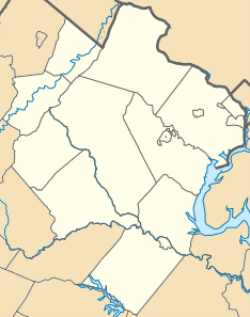Herndon Depot | |
 The former Herndon Depot, now the Herndon Historical Society Museum. | |
| Location | Elden Street, Herndon, Virginia |
|---|---|
| Coordinates | 38°58′12.7″N77°23′08.7″W / 38.970194°N 77.385750°W |
| Area | 3 acres (1.2 ha) |
| Built | 1857, 1875 |
| NRHP reference No. | 79003039 [1] |
| VLR No. | 235-0001 |
| Significant dates | |
| Added to NRHP | June 18, 1979 |
| Designated VLR | April 17, 1979 [2] |
The Herndon Depot Museum, also known as the Herndon Historical Society Museum, is located in the town of Herndon in Fairfax County, Virginia. [3] Built in 1857 for the Alexandria, Loudoun & Hampshire Railroad, the depot later served the Richmond and Danville Railroad, the Southern Railway and the Washington and Old Dominion Railroad. [4] [5] In 1875, the original shed was replaced with the current depot. [6]
The structure is located at 717 Lynn Street, at the intersection of the Washington & Old Dominion Railroad Trail and Station Street, north of Elden Street (signed nearby as Virginia State Routes 228 and 606). [7] [8] The building is adjacent to Town Hall Square, which contains the Herndon Town Hall, built in 1939 as a Works Progress Administration project to house all of the Town's administrative offices. [4] [8]
The museum houses railroad memorabilia, information on United States Navy Commander William Lewis Herndon, for whom the town was named, and artifacts from the USS Herndon (DD-198), from World War II, and from local residents. [9] The Herndon Historical Society operates the museum. [7]
The depot was the site of a raid that Confederate Army Captain John S. Mosby led on St. Patrick's day in March 1863. [10] Mosby and his men surprised the Union Army picket guarding the station and captured officers, soldiers and horses with no Confederate casualties. [10]
The railroad was an integral part of Herndon's agricultural history as large dairy farms surrounded the village. [8] [11] Farmers would ship milk on the railroad daily to Washington for processing and distribution. [8] The railroad station became a center of the community. [8] Businesses sprang up around the station, attracted by the ready access to transportation. [8] The depot and its potbellied stove also served as a central meeting place for Herndon citizens. It was in the depot that the name for Herndon was chosen. [6]
With the advent of cars, trucks and better roads, the railroad became less of a necessity for Herndon farmers and residents. [8] The last passenger train rolled through in 1952 turning the depot into a place to unload freight. [6] The last major assignment for the railway was hauling sand to be used in the concrete mix for runways at Washington Dulles International Airport. [8] The railroad and the depot closed in August 1968. [8]
In 1969, business owners wanted the depot torn down, calling it an eyesore, and VEPCO - who owned it - saw it as a fire hazard and was inclined to raze it; but after local historical associations argued to save it and service groups promised to work on it, it was saved. [6] [12] In 1970, the Herndon Historical Society was organized and began restoration of the depot, which was completed in 1974. [13]
The depot building is a rectangular, one-story wooden vertical board and batten structure, measuring 70.5 by 20.1 feet (21.5 m × 6.1 m). [4] Victorian style buttresses under the eaves are the building's only decorative feature. [4] The window and door framings and the two baggage doors are original, as are the semaphore and several pieces of hardware. [4]
The Heritage Conservation and Recreation Service of the United States Department of the Interior added the building to the National Register of Historic Places on June 18, 1979. [4] [14] The building's site is marked as part of the Virginia Civil War Trails Program. [10] [15]




